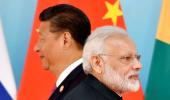'India should not be taken by surprise if the Biden administration seeks China's cooperation at some point,' alerts Ambassador M K Bhadrakumar.

The phone call from US Secretary of State Antony Blinken to External Affairs Minister s Jaishankar materialised on January 29, only three days after the Senate confirmation of his appointment.
The state department and South Block readouts are here (external link) and here (external link).
Blinken also spoke with (external link) his Pakistani counterpart yesterday.
The Biden administration has already made two high-level contacts with Kabul when the new NSA in the White House Jake Sullivan called his Afghan counterpart on January 22 and Blinken himself spoke with (external link) President Ashraf Ghani on January 28.
On January 27, National Security Advisor Ajit Doval also spoke to Sullivan (external link) and on the same day, US Defence Secretary Lloyd Austin had a phone call (external link) with Raksha Mantri Rajnath Singh.
Clearly, the Biden administration is prioritising the diplomacy towards the region surrounding India.
In fact, in an online programme Friday sponsored by the US Congress-funded US Institute of Peace, Sullivan stated that dealing with China, Afghanistan and Iran are key early priorities for the new administration.
One way or another, India becomes a stakeholder.
'From our perspective, a critical early priority has to be to deal with what is an escalating nuclear crisis as they (Iran) move closer and closer to having enough fissile material for a weapon. We would like to make sure that we establish some of the parameters and constraints around the program that have fallen away over the course of the past few years,' Sullivan said.
Regarding Afghanistan, Sullivan stated that the February 2020 Doha pact had three conditions that 'stand out' -- namely, the Taliban's cutting of ties with 'terrorist' groups; their 'meaningful' reduction of violence and support of ceasefires; and, their participation in 'real ... not fake' negotiations with the Afghan government.
'What we're doing right now, is taking a hard look at the extent to which the Taliban are in fact complying with those three conditions, and in that context, we make decisions about our force posture and our diplomatic strategy going forward,' he said.
Conceivably, the US is about to mothball the troop withdrawal plans and put the blame on the Taliban.
Pentagon spokesman John Kirby had told reporters last Thursday, 'Without them (the Taliban) meeting their commitments to renounce terrorism and to stop the violent attacks on the Afghan National Security Forces ... it is very hard to see a specific way forward for the negotiated settlement, but we're still committed to that. Thus far, the Taliban has been, to put it politely, reticent to meet their requirements.'
On China, Sullivan was rhetorical on human rights issue and democracy.
As he put it, the US needs to speak with clarity and consistency and needs to be 'prepared to act, as well to impose costs, for what China is doing in Xinjiang, what it is doing in Hong Kong, for the bellicosity and threats it is projecting towards Taiwan'.
But he did not elaborate on any specific steps.
Sullivan disclosed that China issue was at the top of those to be addressed between the US and allies in Europe and stressed the need to agree on joint responses with Europe on China's trade and technology abuses.
In his words, 'We don't have entirely aligned perspectives on every one of these issues ... I think China is right at the top of the list of things that we've got to work together on and where there is work to do to get fully aligned.'
It is against such a complex backdrop that Blinken spoke with Jaishankar.
Obviously, China was the elephant in the room.
Blinken underscored the Biden administration's continued adherence to the Indo-Pacific strategy, including the Quad.
But the emphasis in the Indian readout (external link) is on a 'multi-faceted strategic partnership' that includes defence and security ties, economic engagement, health-care collaboration and people-to-people linkages as its 'important pillars'.
The readout concludes saying the two ministers 'also reiterated their commitment to peace and security, especially in the Indo-Pacific region'.
Blinken sequenced his calls to Asia-Pacific counterparts carefully by speaking first to his counterparts in Tokyo, Seoul, Canberra, Manila and Bangkok.
He praised the US' alliances with Japan ('cornerstone of peace, security, and prosperity for afree and open Indo-Pacific region and across the globe'); South Korea ('linchpin of peace, security, and prosperity for a free and open Indo-Pacific region and across the world'); and Australia ('bedrock of our mutual democratic alliance and committed to strengthening the unbreakable bond between the two countries').
But in a toned-down reference, Blinken viewed India's role as that of a 'pre-eminent US partner' in the Asia-Pacific.
To be sure, the US has great need for keeping India on board its 'Indo-Pacific' strategy today, which is not gaining traction in the region.
The US' European allies too are showing reluctance to get entangled in the US' rivalry with China for global dominance.
German Chancellor Angela Merkel has outright rejected the idea (external link) of an anti-China bloc.
Curiously, none of the readouts of Blinken's conversations with counterparts in the key European capitals -- Paris (external link), Berlin (external link), London (external link), Brussels (external link) -- even mentioned 'Indo-Pacific strategy.
What comes to mind is Jaishankar's recent speech in Delhi on India-China border tensions where he said that the relationship is 'today truly at a crossroads', and warned obliquely that Delhi may be compelled to make 'choices' that could have 'profound repercussions'.
Blinken's call came one day after Jaishankar's speech.
The US readout highlighted that the two foreign ministers 'agreed to coordinate closely on global developments and look forward to meeting in person at the earliest opportunity.'
From the Indian perspective, any signposts regarding the US-Russia-China triangle will be of exceptional importance, being an enigmatic component of international politics that other countries should approach only with trepidation.
India's foreign policy drifted far too close to the US-Russia-China triangle for comfort during the most recent years.
India is familiar with the diplomatic challenge, as there have been quite a few inflection points in the past seven decades.
India avoided getting sucked into the vortex of big power rivalries, but the collective memory is getting lost today.
History should not begin with the violent incident in the Galwan Valley in Eastern Ladakh in June.
Nor is it the end of history.
A good cooperative relationship with China is not a matter of choice.
It is a must -- not only because it is hugely consequential, but can be of great benefit as India climbs up the ladder as an economic power.
India managed to sequester that relationship from the intractable border issues and can do so even now.
China's rise is unstoppable and further journey on the 'India-Pacific' pathway will bring no benefits.
The US is inexorably in decline and Biden's will concentrate on arresting the societal disintegration in America by addressing the root causes of it in the economic, political and social spheres.
Even the US' European allies are sceptical (external link) whether Biden will succeed in that direction.
The deep polarisation in domestic politics that renders the archaic political system dysfunctional does not lend itself to an easy solution.
Therefore, India should not be taken by surprise if the Biden administration seeks China's cooperation at some point.
Beijing has signalled (external link) that COVID-19, economic recovery and climate change could be priority areas for cooperation for the near term.
The Indian readout of Jaishankar's conversation with Blinken strikes the right chord.
A good opportunity is at hand to shift the transactional relationship with the US riveted on arms sales towards a truly multi-faceted partnership that helps India's development, create jobs and modernise the economy to make it innovative, dynamic and productive -- like China's.
Ambassador M K Bhadrakumar served the Indian Foreign Service for more than 29 years.
Feature Presentation: Aslam Hunani/Rediff.com








